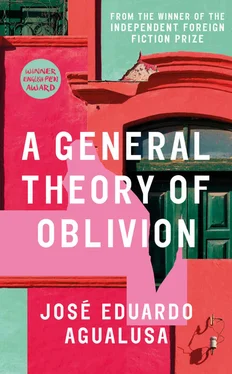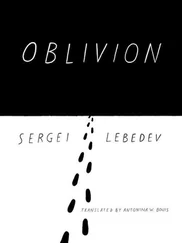‘You’re weak,’ spat Baiacu. ‘You’ll never be king.’
From that day on, to make Sabalu a man — just a man since he’d never be able to transform him into a king — he started taking him along on short pilfering expeditions. These would happen in the late afternoons, when the bourgeois were heading home in their cars, languishing in traffic jams for hours on end. There was always some poor soul who’d roll down a window, either to let in some air because the air conditioning wasn’t working, or to ask someone a question. Then Baiacu would spring out of the shadows, his face spiked with pimples, his wide eyes aflame, and hold a shard of glass to their neck. Sabalu would stick his hands through the window and take a wallet, a watch, any object of value within his reach. Then the two of them would race away into the confusion of cars and people shouting threats, and the fury of car horns, occasionally gunshots.
It had been Baiacu’s idea to climb the scaffolding. He instructed Sabalu:
‘You climb up, see if there’s a window open anywhere and get in without making noise. I can’t do it. Heights make me really sick. Also, the higher I go, the shorter I feel.’
Sabalu climbed up onto the terrace. He saw the dead chickens. He walked down the stairs and discovered an apartment that was stripped to the bone, without furniture, without doors or flooring. The walls, which were covered in inscriptions and strange drawings, scared him. He backed slowly towards the staircase. He told Baiacu there was nothing there. The next night, however, he climbed the scaffolding again. This time he ventured across the few remaining floor tiles. In the bedroom he found the old woman sleeping on a mattress, clothes in one corner. The kitchen was the only place in the house that looked normal, apart from the walls that had been blackened by smoke. There was a heavy-looking table, marble-topped, an oven and fridge. The boy took out a bread roll that he’d brought from his pocket — he always had a bread roll in his pocket — and put it on the table. In a drawer he found a set of silver cutlery. He put it in his rucksack and left. He handed the cutlery over to Baiacu. The boy was impressed, and whistled:
‘Good work, kid. You didn’t find any dough, any jewels?’
Sabalu said no. There was more poverty up there than down here on the streets of Luanda. Baiacu didn’t agree:
‘You’re going back tomorrow.’
Sabalu just nodded. He asked for money to buy some bread. He put the bread, a stick of butter and a bottle of Coke into his rucksack and scaled the building. When Baiacu saw him coming back empty-handed, he exploded. He threw himself on Sabalu, punching and kicking. He knocked him down. He went on kicking his head, his neck, till Diogo held his arms and pulled him off. The following night, Sabalu climbed up to the terrace again. This time he found Ludo sprawled on the floor. He came back down, very alarmed. He asked Baiacu to let him buy medicine. The old woman had fallen over. She looked really bad. But the other boy didn’t even listen:
‘I don’t see wings on your back, Sabalu. If you haven’t got wings, you’re not an angel. Let the old woman die.’
Sabalu fell silent. He accompanied Baiacu and Diogo to Roque Santeiro. They sold the cutlery. They had lunch around there, in a bar that rose up, perched on stilts, over the Babel-like confusion of the market. Sabalu let Baiacu finish his beer. Then he dared to ask whether he might have some of the money for himself. After all, he’d been the one who’d brought the cutlery. The other boy was enraged:
‘What do you want the dough for? Anything you need I give you. I’m like a father to you.’
‘Let me just see the money. I’ve never seen so much all together.’
Baiacu handed him the thick wad of banknotes. Sabalu grabbed hold of them. He jumped down from the terrace onto the sand. When he got back to his feet, his knees were bleeding. He ran, slipping through the crowds, while Baiacu, leaning over the ledge, yelled insults and threats:
‘Thief! Son of a bitch! I’m going to kill you.’
Sabalu bought medicine and food. It was getting late when he returned to Quinaxixe. He saw Baiacu sitting with Diogo beside the scaffolding. He approached another kid and handed him five banknotes:
‘Tell Baiacu I’m waiting for him at the Verde Bar.’
The boy ran off. He passed on the message. Baiacu leapt to his feet and went, followed by Diogo, in the opposite direction. Sabalu climbed the scaffolding. He didn’t breathe easy till he had reached the terrace.
DANIEL BENCHIMOL INVESTIGATES LUDO’S DISAPPEARANCE
Daniel Benchimol read through the letter from Maria da Piedade Lourenço twice. He phoned a friend of his father’s, a geologist, who had devoted his entire life to diamond prospecting. Old Vitalino remembered Orlando very well:
‘A good fellow, very ugly. Really stiff and skinny, always standing very tense, as though he were wearing a shirt with studs in it. They called him Spike. Nobody wanted to have a coffee with him. He didn’t make friends. He disappeared not long before Independence. He took advantage of the chaos, stuck a few stones in his pocket, and ran off to Brazil.’
Daniel did some research online. He found hundreds of people called Orlando Pereira dos Santos. He wasted hours following every clue, any mention, that might take him from the name to the man he was after. No luck. He found it strange. A man like Orlando, living for twenty-something years in Brazil, or in any country that wasn’t Afghanistan, or Sudan, or Bhutan, would have to leave some trace on the great virtual web. He called up Vitalino again:
‘Did this Orlando guy have any family in Angola?’
‘Probably. He was from Catete.’
‘Catete? I thought he was Portuguese!’
‘No, no! Catete, hundred per cent. Real light skin. After the twenty-fifth of April he insisted on reminding us of his origins. He boasted of having lived with Agostinho Neto himself. Would you believe it? A guy who all those years had never once raised his voice against colonialism. I should add, for the sake of the whole truth, that he didn’t do deals with racists, he never did that. He always acted like a decent kind of guy. He acted with just the same arrogance towards both whites and blacks.’
‘And his family?’
‘Well then, his family. I think he was a cousin of Vitorino Gavião.’
‘The poet?’
‘A tramp. Call him what you like.’
Benchimol knew where to find Vitorino Gavião. He crossed the street and went into Biker. The historic beer hall was almost empty at this time of day. Sitting at one table, towards the back, four men were playing cards. They were arguing loudly. They fell silent when they saw him approach.
‘Careful!’ said one of them sharply, in a pretend whisper but wanting the journalist to hear him. ‘The establishment press has arrived. The owner’s voice. The owner’s ears.’
Benchimol was annoyed:
‘If I’m the voice of the regime, you’re the excrement.’
The one who had whispered straightened up:
‘Don’t get annoyed, comrade. Have a beer.’
Vitorino Gavião let out a bitter laugh:
‘We’re the Greek chorus. The voice of the nation’s conscience. That’s what we are. Here we sit, in the gloom, passing comment on the progress of the tragedy. Giving warnings to which nobody pays heed.’
A runaway baldness had robbed him of the thick head of hair, Jimi Hendrix-style, with which in 1960s Paris he had proclaimed his n é gritude . The way he was now, his skull smooth and shining, he could pass for a white man even in Sweden. Well, perhaps not in Sweden. He raised his voice, curious:
‘What’s the news?’
Читать дальше












